
This module illusrates navigation to and use of Opposing Viewpoints from the Alabama Virtual Library. All videos are closed-captioned.
- Subject:
- Information Science
- Material Type:
- Module
- Author:
- Kelly Griffiths
- Date Added:
- 05/28/2019

This module illusrates navigation to and use of Opposing Viewpoints from the Alabama Virtual Library. All videos are closed-captioned.
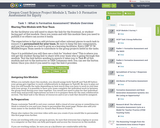
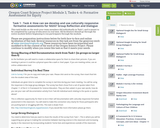
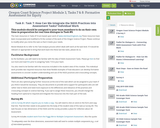
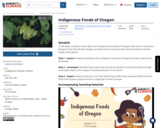
SYNOPSIS: In this lesson, students learn about the Indigenous first foods of Oregon, discuss the connection between food and climate change, and take action to improve their personal health and the health of the planet.
SCIENTIST NOTES: This lesson allows students to explore the history of the Indigenous Peoples of Oregon and how they coped with their food systems under the past and present climate. It also underscores the impact of food production on the climate, how their food choices influence human and environmental health, and proposes strategic measures to mitigate emissions from the food sector and food choices that could improve human and environmental health. All the materials were reviewed, and this lesson has passed our science credibility process.
POSITIVES:
-Students learn about the Indigenous Peoples of Oregon and their food traditions.
-Students feel empowered to make food choices that are better for the planet.
ADDITIONAL PREREQUISITES:
-Students should have some awareness of climate change and how it is affecting the Earth. Teacher can show the video Introduction to Climate Change before the lesson.
-Students should be aware that the Indigenous Peoples of Oregon are the original people of Oregon and that European settlers stole land that belonged to the Indigenous Peoples.
-When students fill out the food tracker, teacher may need to explain that “kg” is short for kilogram, that a kilogram is a kind of measurement, and that 1 kg is about 2.2 pounds.
-Keep in mind that students in elementary school often have little to no control over their food choices. Be sensitive to the fact that some students will have less access to more climate-friendly foods, and try to encourage students to make climate-friendly food choices when they have the opportunity to do so.
DIFFERENTIATION:
-The Inquire section offers a variety of ways for students to learn about the Indigenous Peoples of Oregon and Indigenous first foods. Students can research the topic independently using the sources provided, read specific passages from the texts in small groups, or follow along as the texts are read aloud.
-Students can use the bar graph in the Investigate section of the Teacher Slideshow to explore why some foods are worse for the planet than others. Students can pick one food and research the number of resources needed to grow, harvest, or produce the food. Students can work individually or with a partner.
-Students can use a Venn diagram to compare and contrast one Indigenous Oregonian food with a food they eat. For example, students can explore the process of how salmon from the Columbia River and farm-raised salmon from the local grocery store make it to a student’s plate. Alternatively, students can draw the process and use arrows in between each stage.
-Using the Connecting First Foods and Conservation resource from the Inquire section, students can write the origin story for a native food from their own cultural or ethnic background.
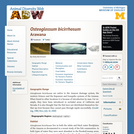
Osteoglossum bicirrhosum: Information

In this one hour webinar, we’ll discuss best practices and practical strategies for deciding when and how much of a copyrighted work you can include under fair use. After the workshop, educators will be able to enrich their course materials with photos, video clips, newspaper articles, and more. Better yet, they will know how to share them with a larger audience.
Bookmarks
Introduction: 0:00
Mini Intro to Copyright and Creative Commons: 9:33
Tools & Resources: 15:45
Language Specific Examples: 26:48
Webinar Materials
- Webinar Slides: https://docs.google.com/presentation/...
- Overcoming Copyright Fear Worksheet: Fair Use: https://docs.google.com/document/d/1z...
- Overcoming Copyright Fears Questions Document: https://docs.google.com/document/d/1_...
Connect with the Pathways Project on Social Media:
- Instagram: https://www.instagram.com/boisestatep...
- LinkedIN: https://www.linkedin.com/groups/9178362/
- Twitter: https://twitter.com/PathwaysBSU
Overcoming Copyright Fears Webinar by The Pathways Project is licensed under a Creative Commons Attribution-NonCommercial-ShareAlike 4.0 International License.
http://creativecommons.org/licenses/b...
Acknowledgement
The Pathways Project is grateful to provide this professional development opportunity thanks to a recently awarded National Endowment for the Humanities Digital Humanities Advancement Grant.
About the National Endowment for the Humanities
Created in 1965 as an independent federal agency, the National Endowment for the Humanities supports research and learning in history, literature, philosophy, and other areas of the humanities by funding selected, peer-reviewed proposals from around the nation. Additional information about the National Endowment for the Humanities and its grant programs is available at: http://www.neh.gov

Accessing and using Shelton State's online nursing collection.All videos are close captioned.
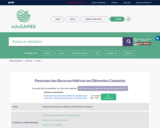
O caderno "Panorama dos Recursos Hídricos em Diferentes Contextos", constitui um dos produtos técnicos educacionais da dissertação intitulada "Percepções e mapeamento de conflitos socioambientais relativos à água nos limites da bacia hidrográfica do Paraguaçu. Este produto foi elaborado tomando como referência a "Enquete operária de Karl Max", apresentamos, portanto, um questionário cujo objetivo é conduzir o leitor a uma reflexão crítica a respeito da sua realidade local e sua relação com os recursos hídricos.

This is an inquiry project about parent involvement in schools. This project includes different types of strategies and the advantages and disadvantages of parent involvement.
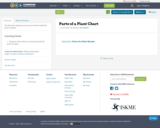
Use this plant diagram to have your students label the parts of a plant
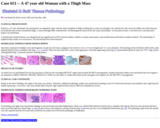
(This case study was added to OER Commons as one of a batch of over 700. It has relevant information which may include medical imagery, lab results, and history where relevant. A link to the final diagnosis can be found at the end of the case study for review. The first paragraph of the case study -- typically, but not always the clinical presentation -- is provided below.)
Patient is a 47 year old female who presented to an outpatient clinic with the chief compliant of thigh swelling due to what was thought to be a blood clot. She received a MRI scan which showed an incidental mass in the contralateral thigh. A more thorough MRI confirmed the 7cm heterogenous lesion in her left vastus intermedius. At this point of time, it was felt to be a sarcoma and a biopsy was performed.
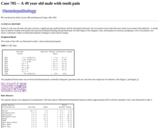
(This case study was added to OER Commons as one of a batch of over 700. It has relevant information which may include medical imagery, lab results, and history where relevant. A link to the final diagnosis can be found at the end of the case study for review. The first paragraph of the case study -- typically, but not always the clinical presentation -- is provided below.)
Patient is a 49 year old male who does not have a significant past medical history until he developed tooth pain. He was found to have tooth abscesses which were treated with antibiotics. A month later, he had his wisdom teeth pulled and experienced delayed healing and persistent pain. He then began to feel fatigued, weak, and dyspnea on exertion, prompting a visit to his primary care doctor. Laboratory studies revealed pancytopenia resulting in a bone marrow biopsy.
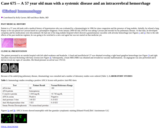
(This case study was added to OER Commons as one of a batch of over 700. It has relevant information which may include medical imagery, lab results, and history where relevant. A link to the final diagnosis can be found at the end of the case study for review. The first paragraph of the case study -- typically, but not always the clinical presentation -- is provided below.)
Patient is a 57 year old male with a medical history of hypertension who was evaluated by a rheumatologist in 1996 for sinus congestion and the presence of lung nodules. Initially, he refused a lung biopsy so he was placed on Cytoxan based on a presumptive diagnosis. From January 2009 till July 2010 he was taking Cytoxan and steroids for his pulmonary disease. At that time, he developed cytopenia and his medications were discontinued. He had one of his lung nodules biopsied which showed a granulomatous vasculitis with alveolar hemorrhage (see Figures 1 and 2). Due to the side effects of his past medicine regimen, he was going to be switched to a new oral agent but was not started on that medicine yet.
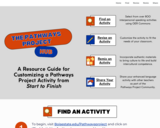
This resource guide brings together the tools from our fall workshop series in one, easy to use site! We will continue to add to this resource, so please consider giving it a bookmark today!
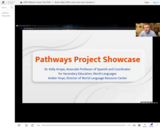
Pathways Project co-directors Kelly Arispe and Amber Hoye hosted a showcase of the Pathways Project on September 24th for the Boise State community and others interested in learning more about the work being done at Boise State.
Webinar Description:
The Pathways Project hosts a collection of over 450 classroom activities across 10 different languages, all collaboratively created by Idaho world language students and teachers. In this workshop, we’ll explore how we’ve used OER Commons to host these ancillary materials, our partnership with world language students and teachers, and share some lessons we’ve learned along the way! Participants will gain an understanding of the features of OER Commons, ideas for co-creating with students, and an understanding of resources available to K-16 language instructors.

This lesson takes a look at the taxes and other deductions that are taken out of a paycheck. Students will also learn how to read a pay stub and will be able to differentiate between gross pay and net pay.
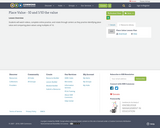
Students will watch videos, complete online practice, and rotate through centers as they practice identifying place value and comparing place values using multiples of 10.

This seminar focuses on the standard plot line. More than just a beginning, middle, and end, plot lines follow an arc with identifiable actions along the way. In short stories, plays, novels, movies, etc., the Freytag Pyramid structure is recognizable. Throughout this seminar, you will use prior knowledge of plot lines to connect to new reading, along with creating your own plot line with identifiable parts.
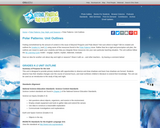
This article assembles free resources from the Polar Patterns: Day, Night, and Seasons issue of the Beyond Penguins and Polar Bears cyberzine into a unit outline based on the 5E learning cycle framework. Outlines are provided for Grades K-2 and 3-5.